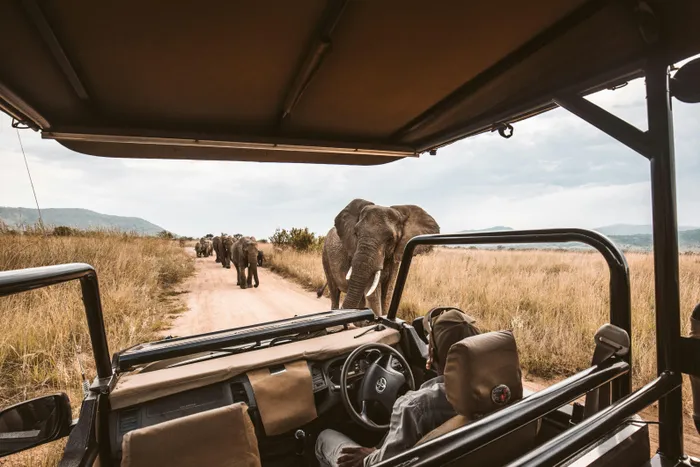
When embarking on safari, there are essential items that you need to pack to make sure that you have an enjoyable experience.
Image: Unsplash
An African safari is an immersive experience that typically involves early morning and late afternoon game drives to observe wildlife in its natural habitat.
These excursions often include stops for drinks or picnics in the bush, allowing you to savour the beauty of the landscape.
While you can expect to see a wide array of animals, a typical day also includes downtime at a lodge or camp, where you can enjoy stunning scenery and delicious cuisine.
Safaris offer a unique, exhilarating and addictive way to connect with the wild.
Despite the early mornings and bumpy rides, they are very safe when led by experienced guides.
Just like camping, there are certain items you need to pack to ensure your trip is comfortable and memorable.
Here are ten essential items you should bring when embarking on a safari game drive.
Polarised sunglasses
The African sun can be intense, making it vital to protect your eyes from harmful ultraviolet (UV) rays.
Polarised sunglasses are essential on safari as they reduce harsh glare and enhance your ability to spot wildlife by cutting through reflections from surfaces like water and open terrain.
These lenses filter out "polarised" light from reflective surfaces, improving visibility and comfort in bright conditions.
Neutral-coloured clothes
Wearing neutral colours such as khaki, brown, beige and olive green helps you blend into the natural surroundings.
This is crucial for observing wildlife without startling them and for minimising insect attraction, especially from tsetse flies, which are drawn to dark colours.
Neutral colours also hide dirt and dust, keeping you looking fresher, and they reflect sunlight better than darker shades, helping to keep you cooler in the heat.
Water
Carrying drinking water on safari is essential to avoid dehydration, especially in hot, dry climates and during long game drives.
Heat stroke and dehydration can ruin your holiday. While camps often provide water, having your own ensures constant access to safe, clean water for drinking, brushing your teeth and preparing for emergencies.
Sunscreen
You will spend extended periods outdoors, often in open-top game drive vehicles, under the strong African sun.
Sunscreen is necessary to protect your skin from painful sunburns and long-term sun damage, even on cloudy days.
Long hours outdoors in vehicles increase your exposure to intense UV rays, making regular application of high-SPF, broad-spectrum sunscreen an essential part of sun safety and overall health during your trip.
Scarf
A scarf serves multiple purposes on safari, protecting from dust, sun and temperature changes.
It can also keep hair out of your face, act as a makeshift towel or blanket, or add a touch of style.
Temperatures can fluctuate drastically between day and night, and game drives often take you along dusty, bumpy roads, making a scarf a practical item to pack.
During game drives on dirt roads, you can pull the scarf up to cover your mouth and nose, protecting against dust kicked up by the vehicle.
Flashlight
A flashlight is essential for personal safety on safari, allowing you to navigate in the dark, avoid wildlife and insects, and see where you are going, especially in unfenced camps or during power outages.
A flashlight also aids in finding animals during night drives or searching for wounded animals, although a headlamp is often more convenient for hands-free use.
Camera
Bring a camera to capture unique moments with wildlife, share experiences with others, and preserve memories of incredible landscapes and animals.
While smartphones are great for spontaneous shots, a dedicated camera offers a long-range optical zoom for distant subjects, better low-light performance, and the ability to take high-resolution images suitable for large prints.
Ensure your camera and its equipment are fully charged, and carry power banks to avoid missing any moments due to a dead phone or camera.
First aid kit
A well-stocked first aid kit is crucial for handling minor injuries, such as cuts, scrapes, and blisters, which can occur in rough terrain. It is also important for managing common ailments like headaches, motion sickness, and dehydration.
Since safaris often take place in remote areas where medical help is limited, having a first aid kit provides self-sufficiency and peace of mind.
Be sure to include allergy medication, cough mixture and painkillers, among other essentials.
Insect repellent
Carrying insect repellent is vital to prevent potentially serious diseases like malaria and tick-borne fever, as well as to avoid discomfort from itchy, painful, and unsightly bites.
Repellent is a crucial line of defence in many African regions, where insects like mosquitoes are active and can transmit serious illnesses, impacting your ability to fully enjoy the safari experience.
Binoculars
Binoculars are essential for viewing animals from a distance, allowing for detailed observation of wildlife that would otherwise be invisible or barely visible to the naked eye.
They enhance the safari experience by bringing distant game into sharp focus, revealing exquisite details of even nearby animals, and providing a brighter, clearer view, particularly for birds and smaller creatures.
Having your own binoculars ensures you don't miss any sightings, as guides may have shared equipment or limited quality.
By packing these essential items, you can ensure a comfortable and enjoyable safari experience that allows you to fully immerse yourself in the beauty and excitement of the African wilderness.
Related Topics: